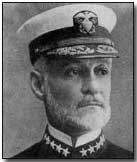Who's Who - William Sims
 William Snowden Sims (1858-1936)
commanded U.S. naval forces in Europe during World War One.
William Snowden Sims (1858-1936)
commanded U.S. naval forces in Europe during World War One.
Prior to U.S. entry into the First World War in April 1917 Sims held a variety of naval intelligence and command positions. A U.S. observer during the Russo-Japanese War of 1904-05 Sims was an advocate of the adoption of British naval gunnery methods in improving U.S. standards of gunnery.
Consistent with the latter recommendation Sims was for much of his naval career regarded at home and abroad as something of an Anglophile, earning notoriety as early as 1910 for suggesting the U.S. would provide naval support to Britain in the event of war - a decidedly unofficial view that met with official disapprobation.
Sims was promoted Captain in 1911 and served as an instructor at the Naval War College from 1911-12, eventually becoming its president in 1917. The year before the U.S. entered the war, in 1916, Sims was promoted Rear-Admiral.
En route to Britain carrying dispatches (and appointed as U.S. liaison officer to the Royal Navy) when the U.S. formally entered the war, Sims was given responsibility for American naval shipping operating from Britain. The following month, in May, Sims was promoted Vice-Admiral and his command extended to encompass U.S. naval forces operating throughout Europe.
Sims' unwavering support for the convoy system - an early meeting with British First Sea Lord Sir John Jellicoe left him with no doubt as to the extent of the damage German submarines were exacting upon British shipping - brought him into conflict with his own superiors, including U.S. Secretary of the Navy Josephus Daniels and with Chief of Naval Operations Benson.
They similarly disagreed with Sims' belief in the integration of U.S. forces with the Royal Navy for the duration of the war; American Expeditionary Force AEF) Commander-in-Chief John J. Pershing was already taking a determined stance to ensure the independent operation of his own force.
He was successful however in making the point - supported by Atlantic commander Frank Mayo - that anti-submarine forces were urgently required in Europe, preparatory to introduction of a convoy system, and arranged for their early shipment to Europe.
Although promoted temporary Admiral the month after the armistice was agreed in December 1918 he subsequently returned to his previous permanent rank of Rear-Admiral, returning to his post at the Naval War College. he finally retired from the navy in 1922, and was promoted to full Admiral on the retired list in 1930.
He did not however remain any less outspoken: a supporter of the value of naval airpower, he increasingly argued that the battleship was obsolete in modern warfare. He was also vocal in stating his belief that both Daniels and Benson had acted to hinder U.S. naval interests during the war - a controversial view that somewhat overshadowed his retirement.
He died in 1936.
'Kitchener's Army' comprised Men recruited into the British Army a result of Lord Kitchener's appeal for volunteers.
- Did you know?
